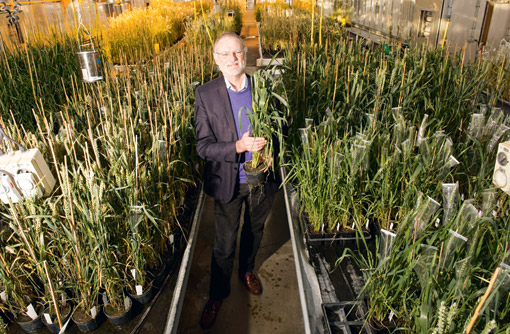Join research club for better crops

Stress-tolerant wheat varieties, reduced pod-shatter in oilseed rape and reduced skinning in barley are three of the many benefits that growers could gain in the coming years by being members of an exclusive research club.
But you don’t need to fill in a registration form to join, pay a subscription or attend meetings. As a levypayer, you are automatically a member of the Crop Improvement Research Club (CIRC), thanks to the HGCA’s participation in the government/industry initiative aiming to underpin the long-term needs of the crop production and processing industries.
“Growers are indirectly sponsoring and guiding CIRC’s research, and will ultimately benefit from the findings,” explains HGCA’s Dhan Bhandari.
“This should help to ensure sustainability and strengthen our competitiveness in the global food market.”
The club’s interests are many and varied, ranging from plant physiology to genetic sequencing in both cereals and oilseed rape. Topics for research were devised by a panel of around 14 core organisations representing the plant breeding, processing and research industries. Each group member pays at least £10,000 a year, which is matched by the Biotechnology and Biological Sciences Research Council (BBSRC).
So far, the six-year ongoing programme has supported 15 research projects and 10 PhD studentships. Many of them focus on developing sustainable new crop varieties able to tolerate the problems that may arise in our ever changing climate.
Chairman of CIRC’s steering committee, Keith Norman of Velcourt, recognises genetic improvements can take a long time to reach the farmgate.
But, club members are already making use of the first round of CIRC results. For example, RAGT Seeds is using the “deciphered” bread wheat genome to select for useful agronomic and quality traits.
The bread wheat genome sequencing project led by the University of Bristol has taken the genome’s raw data published two years ago and put the 96,000 genes identified in an approximate order. This turns the genome from a set of complex data into a useful tool for plant breeders.
Crops perspective
- With huge industry sponsorship from numerous sectors supporting strong research objectives, this collaborative project should deliver substantial benefits. Genetic improvement is high on the agenda, meaning growers may have a long wait. But at least the outcome of one first-round project promises to speed up the plant breeding process.
HGCA perspective:
- Developing varieties offering good yield and disease resistance with lower inputs
- Improving crop quality by understanding genetics of seed structure, germination and grain spoilage
- Tailoring varieties to UK environmental and market conditions by better linking plant breeding, production and processing
“Desirable genes from commercial varieties and their wild ancestors can now be spotted much easier in breeding trials, which will speed up the introduction of varieties with better disease resistance, stress tolerance and the like. There’s no doubt after seasons like the last that we need to find traits to buffer varieties against extremes of weather as fast as we can,” stresses Mr Norman.
Summary
- Project no. 3476: Crop Improvement Research Club. BBSRC, the Scottish Government, HGCA, James Hutton Institute, John Innes Centre, NIAB, Rothamsted Research, SRUC (formerly SAC), the Universities of Bristol, Glasgow, Nottingham and Warwick, and numerous industry representatives. From January 2010 to December 2015.
He is also excited by the prospect of manipulating photosynthetic carbon metabolism to enhance wheat yields – the objective of another project. If plants could convert sunlight to yield more efficiently, growers could realise wheat’s full potential, he says.
The projects are not just aimed at growing better crops, explains Dr Bhandari. Many tackle processing dilemmas, such as whether or not maltsters can improve malting efficiency by adding natural plant products, called iminosugars, to barley. Another is investigating the causes and control of grain skinning, which complicates processing.
Under the spotlight in oilseed rape are pod shatter and the influence of beneficial root micro-organisms on yield. The project results will be used to develop new varieties and products to enhance the yield and quality of the crop, he says.
“CIRC is an exclusive club that works for the benefit of all its members, including growers. We plan to continue researching such fundamental work well after the current projects come to an end, hopefully with the National Environmental Research Council on board.”

